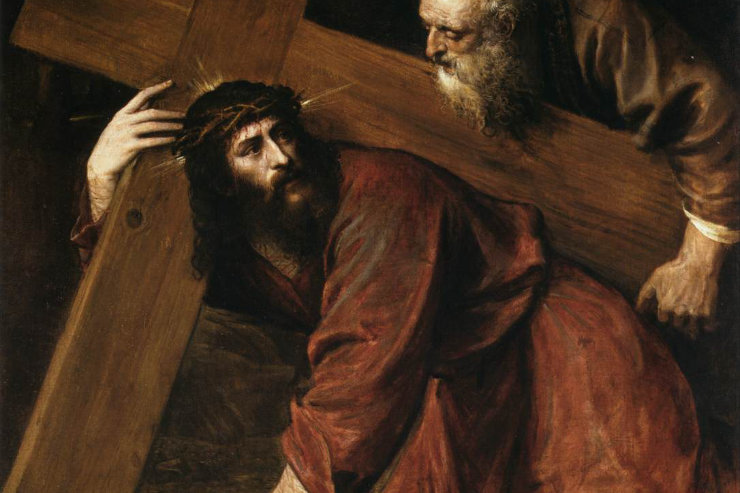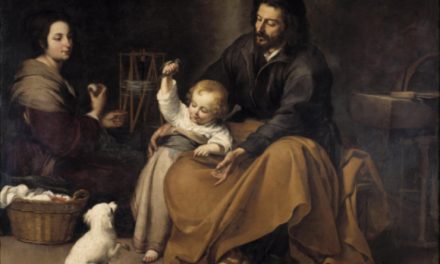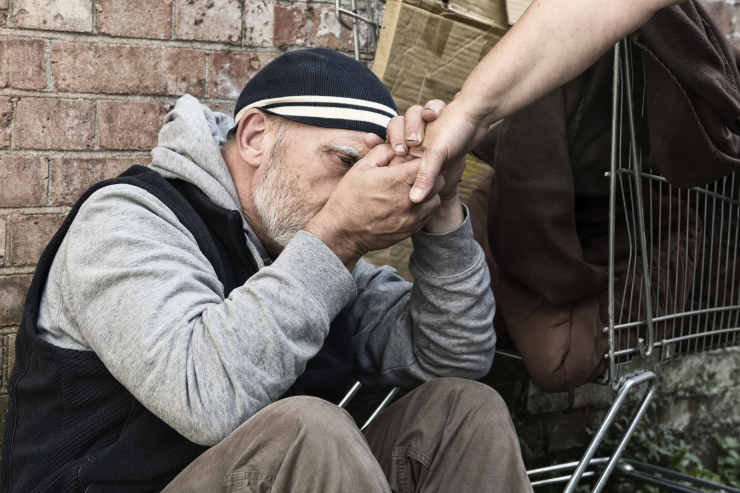Maybe this Good Friday, you are suffering under a cross. It may be a large cross – sickness, divorce, loneliness, infertility, or the loss of a loved one. Or it may be a small cross – a misunderstanding, changes of plans, inconveniences, or tiredness. Whatever the cross may be, you are not alone. Jesus is next to you. You are carrying it together.
Who was Simon of Cyrene?
We meet Simon in the three synoptic Gospels as Jesus carries his cross to his place of execution, Golgotha. We remember him in the fifth station every time we pray the traditional Stations of the Cross.
“And as they led him away, they seized one Simon of Cyrene, who was coming in from the country, and laid on him the cross, to carry it behind Jesus” (Luke 23:26).
Admittedly, we know very little about Simon. The evangelists tell us Simon was “pressed into service” or “compelled” to help Jesus carry his Cross. So it seems that he was not a follower of Jesus, but merely a passerby, coming into the city. Yet he was chosen. He was given the honor of helping Jesus carry the cross.
We don’t know how he reacted to this. We really only know one thing: he suffered for Jesus.
That suffering must have changed his life, because suffering always changes our lives. How it changes our lives is up to us. This suffering may have made Simon bitter and resentful. Put yourself in Simon’s place. He was forced by Roman soldiers, reminders of the brutal occupation of Rome, to help a condemned criminal carry the instrument of his death. It would be easy to be angry, disgusted by this task. He probably had the thought, “I’m a law-abiding citizen, minding my own business! I don’t deserve this man’s punishment. Why should I carry this heavy cross?” Simon’s suffering could have filled him with hate, turning him away from Jesus.
Picture yourself picking up the cross for the Jesus. He has just fallen. He is bleeding from his scourging, and is almost too weak to stand up. Maybe you can barely stand to look at him. He is dirty and tired. Blood from the crown of thorns runs down his face and into his eyes so he can barely see. Does he look like the Messiah?
But perhaps those eyes, looking at you through the blood, speak loudly to you. These are the eyes that looked lovingly at the rich young man. The eyes that looked at Peter after his betrayal. They are powerful, deep, compassionate, loving eyes. And now they look at you.
Simon suffered for Jesus. That suffering could have turned him away from Jesus. Or it could have turned him toward Jesus. Did he feel compassion and want to help this innocent man? Did his heart swell with an inexplicable desire to help him, to love him, to serve him? Feeling the splintered wood on his back, did he whisper a prayer to the God of his fathers, feeling a closeness to the bloody man who now walked beside him?
We don’t know how willingly Simon took up the cross, but we know that he literally did what Jesus commanded in Matthew 16:24: “If anyone would come after me, let him deny himself and take up his cross and follow me.”
How did the Apostles hear this command? It would would have been a frightening image for them. Crucifixion was a horrible spectacle. It was a long, painful, humiliating way to die. It was punishment for revolutionaries, insurrectionists, and murderers. To hear Jesus speak this way would have been shocking to the Apostles. We read these words as figurative language, but what would they have sounded like to the Apostles? Have Jesus’ words lost their shock? Have they become too familiar to us?
Yet we know that Jesus also promises us life. He promises us abundant life. But he also tells us if we wish to have life, we must lose it. If we want to have life… we must suffer.
You see, there are two ways suffering can change our lives. It can make us bitter and resentful, especially suffering we don’t understand or do not seem to merit. It can turn us away from Jesus.
Or it can draw us to him. It can enlarge our heart to make us more capable of receiving God’s love and showing love to others.
St. Mark identifies Simon as “the father Alexander and Rufus.” This seems to indicate that these men were known in the early Christian community. Perhaps that gives us a hint as to how that day affected Simon and his family. Simon’s suffering may have enlarged his heart and converted his soul. And his family, rather than to be ashamed that their father was seen with a condemned criminal, may have born it as a badge of honor.
Simon’s greatest honor was to suffer with Jesus.
Maybe this Good Friday, you are suffering under a cross. It may be a large cross – sickness, divorce, loneliness, infertility, or the loss of a loved one. Or it may be a small cross – a misunderstanding, changes of plans, inconveniences, or tiredness. Whatever the cross may be, you are not alone. Jesus is next to you. You are carrying it together.
Ask the Lord for patience, fortitude, and love on this Via Dolorosa. Ask him to help you see your cross as an honor. Think of Simon. It may not have seemed like an honor at the time. But think of the grace of that moment: to be chosen to help Jesus carry the cross. It was the greatest moment of his life. Did he see it that way?
How can you be like Simon? Think of those around you with crosses. Perhaps helping them doesn’t seem like an honor. When people around us are suffering, especially suffering that seems unjust or unexplainable, it can be easy to want to turn away. We try to rationalize how it would be better to not get involved. But how is Jesus asking you to be like Simon in the lives of your family, friends, coworkers, and even enemies?
Jesus, I offer my crosses to you. Purify my heart so that I can see your work, your will, and your love even in the pain and suffering. Give me the fortitude to carry my cross and to help others carry theirs. Jesus, I trust in you.
Image credit: “Christ Carrying the Cross” (detail) by Titian, Public domain, via Wikimedia Commons



![“You ask too little [of God]”](https://integratedcatholiclife.org/wp-content/uploads/crucifix-coan-detail-featured-w480x300.jpg)










